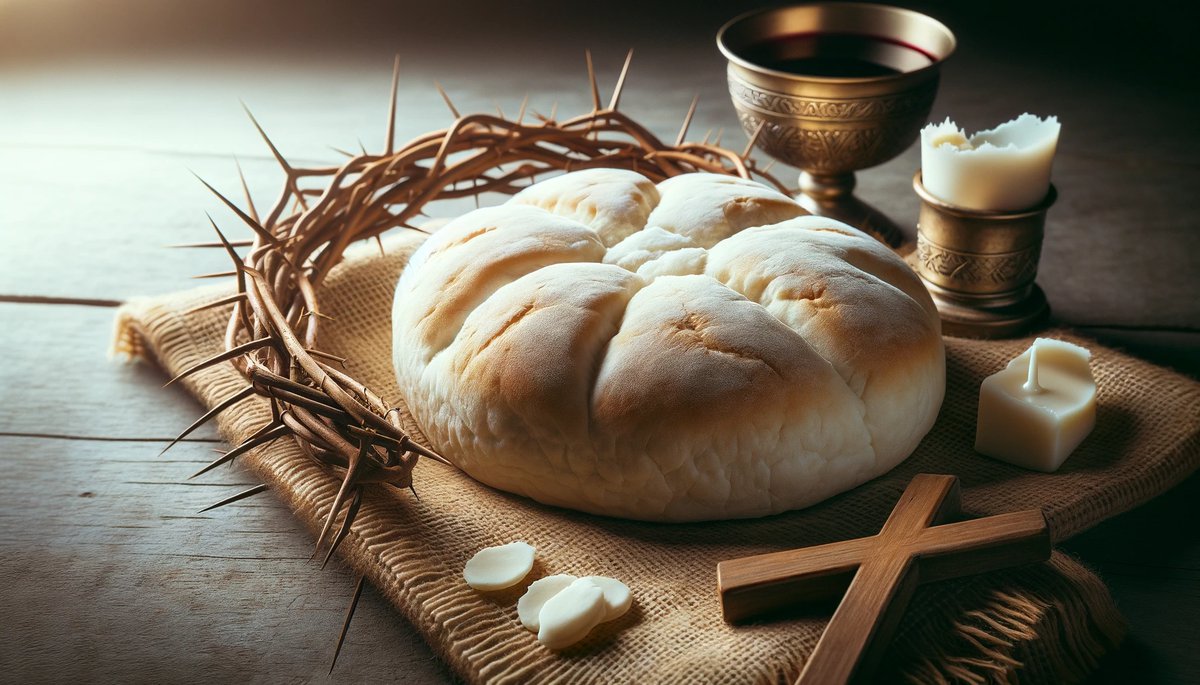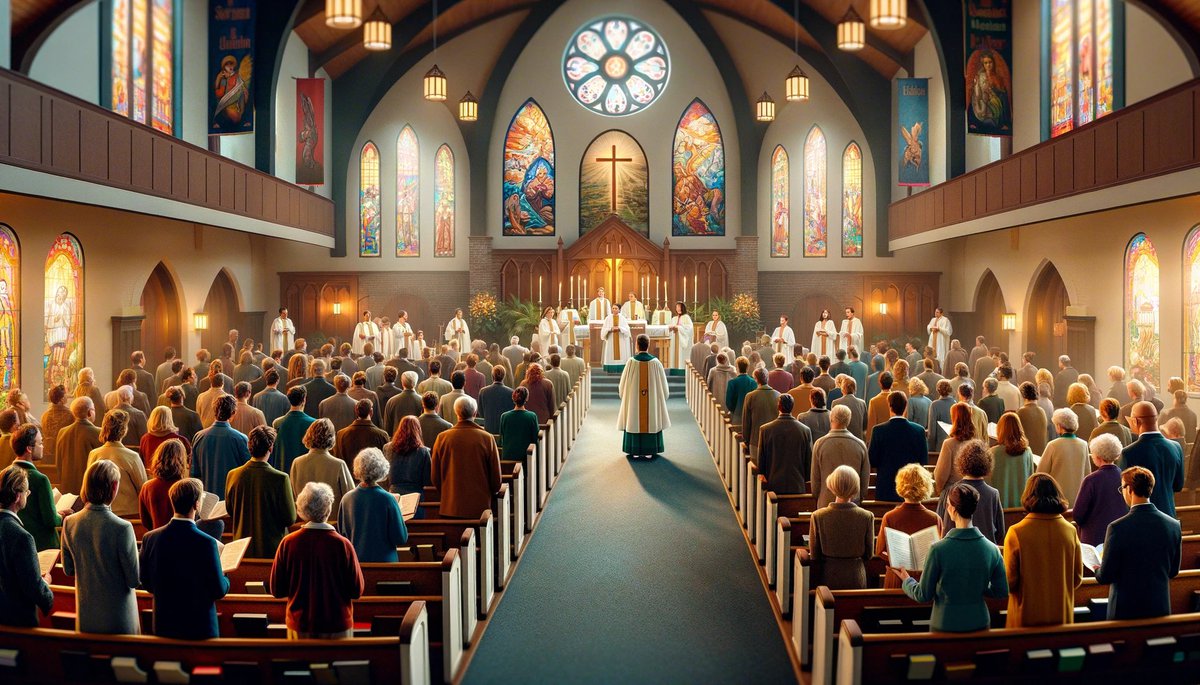Home>Theology and Spirituality>Why Closed Communion


Theology and Spirituality
Why Closed Communion
Published: February 19, 2024
Jason DeRose, Managing Editor at Christian.net, uses his expertise in religion and journalism to deepen understanding of faith's societal impacts. His editorial leadership, coupled with a strong academic background, enriches the platform’s diverse content, earning him recognition in both journalism and religious circles.
Discover the significance of closed communion in theology and spirituality. Explore the reasons behind this practice and its impact on religious communities.
(Many of the links in this article redirect to a specific reviewed product. Your purchase of these products through affiliate links helps to generate commission for Christian.net, at no extra cost. Learn more)
Table of Contents
Introduction
Closed communion is a practice observed in various Christian denominations, where only baptized members of a particular church or denomination are allowed to partake in the sacrament of the Lord's Supper or Holy Communion. This practice, often steeped in tradition and theological convictions, has sparked discussions and debates within the Christian community. Understanding the rationale behind closed communion requires delving into its historical, biblical, and theological underpinnings. It is a topic that invites reflection on the nature of Christian unity, the significance of the Eucharist, and the diversity of beliefs and practices within the broader Christian faith. In exploring the concept of closed communion, we can gain insights into the rich tapestry of Christian traditions and the deeply held convictions that shape the worship and sacramental practices of different denominations.
Read more: Why Is It Called Communion
Understanding Closed Communion
Closed communion, also known as close communion, is a practice observed in certain Christian denominations, where the sacrament of the Lord's Supper or Holy Communion is restricted to baptized members of a specific church or denomination. This means that individuals who are not part of the particular faith community are not permitted to participate in the Eucharistic celebration. The rationale behind closed communion is rooted in the theological convictions and ecclesiastical traditions of the respective denominations that uphold this practice.
At its core, closed communion reflects a belief in the sacred nature of the Eucharist and the significance of partaking in communion within the context of a specific faith community. Proponents of closed communion emphasize the spiritual and communal dimensions of the Lord's Supper, viewing it as a sacred act of worship and unity reserved for baptized members who share a common faith and doctrinal understanding. This practice serves as a visible expression of the spiritual bond and doctrinal unity among the members of the particular faith community.
Understanding closed communion also involves recognizing the distinctions between various Christian denominations regarding their beliefs about the Eucharist and the qualifications for participation in this sacrament. While some denominations practice closed communion as a means of upholding doctrinal purity and ecclesiastical identity, others adopt open communion, which allows baptized Christians from any denomination to partake in the Lord's Supper. These differing practices reflect the diverse theological perspectives and ecclesiastical traditions that have evolved within Christianity over the centuries.
Furthermore, the understanding of closed communion necessitates an exploration of the implications of this practice on interdenominational relations and ecumenical dialogue. The exclusivity inherent in closed communion has been a point of contention and theological debate within the broader Christian community, particularly in the context of efforts to foster greater unity and cooperation among different denominations. While proponents of closed communion assert the importance of preserving doctrinal integrity and ecclesiastical identity, critics raise concerns about the potential barriers it creates to interchurch fellowship and the pursuit of Christian unity.
In essence, understanding closed communion involves delving into the theological, historical, and ecclesiastical dimensions that underpin this practice. It prompts reflection on the diverse expressions of Christian faith and the varying approaches to sacramental participation within different denominational contexts. By gaining insights into the rationale and implications of closed communion, one can appreciate the rich tapestry of Christian traditions and the complex interplay of theological convictions, ecclesiastical practices, and the pursuit of Christian unity.
Historical Background
The historical roots of closed communion can be traced back to the early centuries of Christianity, where the practice of partaking in the Eucharist was closely tied to the communal life and doctrinal beliefs of specific Christian communities. In the early church, the celebration of the Lord's Supper was a central aspect of Christian worship, symbolizing the spiritual unity and shared faith of the believers. The early Christian gatherings for the Eucharist were characterized by a sense of intimacy and solidarity among the baptized members, reflecting the close-knit nature of the early Christian communities.
As Christianity evolved and diversified, different theological perspectives and ecclesiastical traditions emerged, leading to varying practices regarding the administration of the Eucharist. The concept of closed communion began to take shape as certain Christian communities sought to uphold doctrinal purity and ecclesiastical identity by restricting participation in the Lord's Supper to baptized members who shared their specific beliefs and practices. This emphasis on doctrinal fidelity and communal unity laid the foundation for the development of closed communion within certain denominational contexts.
Throughout the medieval and Reformation periods, the practice of closed communion became more pronounced within the distinct theological frameworks of different Christian traditions. The theological debates and ecclesiastical reforms during the Reformation era further shaped the understanding and practice of the Eucharist within various denominations. The divergent views on the nature of the Eucharist, the role of the clergy, and the qualifications for participation in communion contributed to the formulation of distinct approaches to sacramental fellowship, including the practice of closed communion.
The historical background of closed communion also reflects the broader dynamics of interdenominational relations and ecumenical developments within Christianity. The tensions and divisions arising from differing practices related to the Eucharist have been a significant aspect of the historical interactions between Christian denominations. The historical context of closed communion underscores the complex interplay of theological convictions, ecclesiastical traditions, and the pursuit of doctrinal integrity within the diverse tapestry of Christian history.
In summary, the historical background of closed communion is deeply intertwined with the evolution of Christian worship, theological diversity, and ecclesiastical identity throughout the history of Christianity. This historical perspective sheds light on the multifaceted nature of sacramental practices and the enduring impact of historical developments on the contemporary expressions of Christian faith and worship.
Biblical Basis
The biblical foundation for closed communion is rooted in the New Testament scriptures, particularly in the teachings of the apostle Paul and the narratives of the Last Supper as recorded in the Gospels. Proponents of closed communion often cite these biblical passages to support the practice of restricting participation in the Eucharist to baptized members of a specific faith community.
In 1 Corinthians 11:27-29, Paul admonishes the Corinthian church regarding the manner in which they partake in the Lord's Supper, emphasizing the need for self-examination and discernment. This passage underscores the solemnity and spiritual significance of the Eucharist, highlighting the importance of approaching the sacrament with reverence and a clear conscience. Proponents of closed communion interpret this passage as a call for doctrinal fidelity and spiritual preparedness among those who partake in the Lord's Supper, thereby advocating for a restricted approach to sacramental participation within the context of a specific faith community.
The Gospel accounts of the Last Supper, found in Matthew 26:26-29, Mark 14:22-25, and Luke 22:14-23, depict Jesus sharing the bread and wine with his disciples, instructing them to partake in remembrance of him. These narratives convey the intimate and communal nature of the Eucharistic celebration, portraying it as a sacred act of worship and spiritual communion among the followers of Christ. Proponents of closed communion draw from these accounts to emphasize the idea of shared faith and doctrinal unity among the participants in the Lord's Supper, thereby advocating for a closed or restricted approach to sacramental fellowship.
Furthermore, the broader theological themes of unity, spiritual discernment, and the communal nature of the Eucharist as depicted in the New Testament writings provide a foundational basis for the practice of closed communion within certain Christian denominations. The biblical narratives and teachings related to the Lord's Supper serve as a theological framework for understanding the significance of sacramental participation within the context of a specific faith community, reflecting the deeply held convictions and doctrinal interpretations of those who uphold closed communion.
In essence, the biblical basis for closed communion is intricately woven into the New Testament scriptures, reflecting the theological convictions and interpretive frameworks that shape the sacramental practices of different Christian denominations. The biblical foundation for closed communion underscores the diverse perspectives and doctrinal emphases within the broader Christian faith, highlighting the complex interplay of scriptural interpretation, theological traditions, and ecclesiastical practices related to the celebration of the Eucharist.
Theological Perspective
The theological perspective on closed communion encompasses a rich tapestry of doctrinal interpretations, ecclesiastical traditions, and theological emphases within the diverse landscape of Christian faith. At the heart of the theological perspective on closed communion lies a deep reverence for the sacred nature of the Eucharist and a commitment to upholding doctrinal integrity and communal unity within the context of specific Christian denominations.
Proponents of closed communion approach this practice from the vantage point of doctrinal fidelity and ecclesiastical identity. They emphasize the significance of partaking in the Lord's Supper within the framework of a particular faith community that shares a common confession of faith and doctrinal understanding. From this theological standpoint, closed communion serves as a visible expression of the spiritual bond and doctrinal unity among the baptized members of the specific denomination, reinforcing the communal identity and shared beliefs that define the faith community.
The theological perspective on closed communion also reflects a robust understanding of the Eucharist as a sacred act of worship and spiritual communion. Advocates of closed communion underscore the solemnity and reverence with which the Lord's Supper is approached, viewing it as a deeply meaningful expression of faith and unity within the context of the faith community. This theological emphasis on the spiritual significance of the Eucharist informs the practice of closed communion, highlighting the communal and doctrinal dimensions of sacramental participation.
Furthermore, the theological perspective on closed communion is intertwined with the broader theological themes of Christian unity, ecclesiology, and sacramental theology. It reflects the diverse theological frameworks and interpretive lenses through which different Christian denominations understand the nature and qualifications for participation in the Eucharist. The theological perspectives that underpin closed communion are shaped by the historical, doctrinal, and liturgical traditions of the respective denominations, embodying a nuanced understanding of the Eucharist within the context of communal worship and spiritual fellowship.
In essence, the theological perspective on closed communion encompasses a multifaceted exploration of the sacred, communal, and doctrinal dimensions of the Eucharist within the specific theological frameworks and ecclesiastical traditions of different Christian denominations. It underscores the diverse theological emphases and interpretive lenses that inform the practice of closed communion, reflecting the intricate interplay of theological convictions, ecclesiastical identity, and the pursuit of doctrinal integrity within the broader landscape of Christian faith and worship.
Read more: Why Is Holy Communion Important
Practical Considerations
Practical considerations surrounding closed communion encompass a range of logistical, pastoral, and interdenominational dynamics that shape the implementation and implications of this sacramental practice within Christian communities. From the administration of the Lord's Supper to the pastoral care of congregants and the broader implications for interchurch relations, practical considerations play a significant role in the lived experience of closed communion within the context of specific denominations.
One practical consideration pertains to the administration and oversight of the Eucharist within the faith community. Churches that practice closed communion often establish protocols and guidelines for verifying the baptismal status and membership of individuals seeking to partake in the Lord's Supper. This may involve the use of membership records, baptismal certificates, or other means of authentication to ensure that only baptized members of the specific denomination participate in the sacrament. Pastors and church leaders play a pivotal role in upholding these protocols, providing pastoral guidance and oversight to ensure the faithful administration of the Eucharist in accordance with the denominational practices.
Another practical consideration revolves around pastoral care and the inclusion of visitors and newcomers in worship services. Churches practicing closed communion grapple with the pastoral challenge of welcoming visitors and newcomers while maintaining the integrity of their sacramental practices. Balancing the hospitality extended to visitors with the theological convictions underpinning closed communion requires sensitivity and discernment on the part of church leaders. Pastoral outreach and education efforts aimed at explaining the rationale behind closed communion can help foster understanding and respect for the denominational practices among visitors and newcomers.
Furthermore, practical considerations extend to the broader implications for interdenominational relations and ecumenical dialogue. The practice of closed communion has implications for interchurch fellowship, collaborative ministry efforts, and the pursuit of Christian unity. Churches that uphold closed communion navigate the complexities of engaging in ecumenical initiatives while honoring their sacramental practices and doctrinal convictions. This presents a practical challenge in fostering respectful dialogue and cooperation with other Christian traditions, particularly those that practice open communion.
In essence, practical considerations surrounding closed communion encompass the logistical, pastoral, and interdenominational dimensions that shape the implementation and implications of this sacramental practice within specific denominations. Navigating the administration of the Eucharist, pastoral care for visitors and newcomers, and the broader implications for interchurch relations requires discernment, pastoral sensitivity, and a commitment to upholding denominational practices while engaging in respectful dialogue and cooperation with the broader Christian community.
Conclusion
In conclusion, the practice of closed communion embodies a complex tapestry of theological, historical, and practical considerations within the diverse landscape of Christian denominations. This sacramental practice, rooted in the theological convictions and ecclesiastical traditions of specific faith communities, reflects a deep reverence for the sacred nature of the Eucharist and a commitment to upholding doctrinal integrity and communal unity.
The exploration of closed communion has provided insights into the diverse theological perspectives, historical developments, and practical implications that shape this sacramental practice. From its historical roots in the early centuries of Christianity to its contemporary expressions within various denominations, closed communion underscores the multifaceted nature of sacramental fellowship and the theological diversity that characterizes the Christian faith.
Furthermore, the biblical foundation for closed communion, as evidenced in the New Testament scriptures, highlights the theological framework through which different denominations interpret the significance of sacramental participation within the context of a specific faith community. This biblical basis serves as a foundational anchor for the theological perspectives and doctrinal emphases that inform the practice of closed communion.
Practical considerations surrounding closed communion, including the administration of the Eucharist, pastoral care for congregants and visitors, and the broader implications for interdenominational relations, underscore the lived experience and pastoral dynamics inherent in this sacramental practice. Navigating the pastoral and logistical aspects of closed communion requires discernment, pastoral sensitivity, and a commitment to upholding denominational practices while engaging in respectful dialogue and cooperation with the broader Christian community.
In essence, the exploration of closed communion invites reflection on the diverse expressions of Christian faith, the theological underpinnings of sacramental fellowship, and the pursuit of Christian unity within the context of differing denominational practices. Understanding the rationale and implications of closed communion enriches our appreciation for the rich tapestry of Christian traditions and the deeply held convictions that shape the worship and sacramental practices of different denominations.














